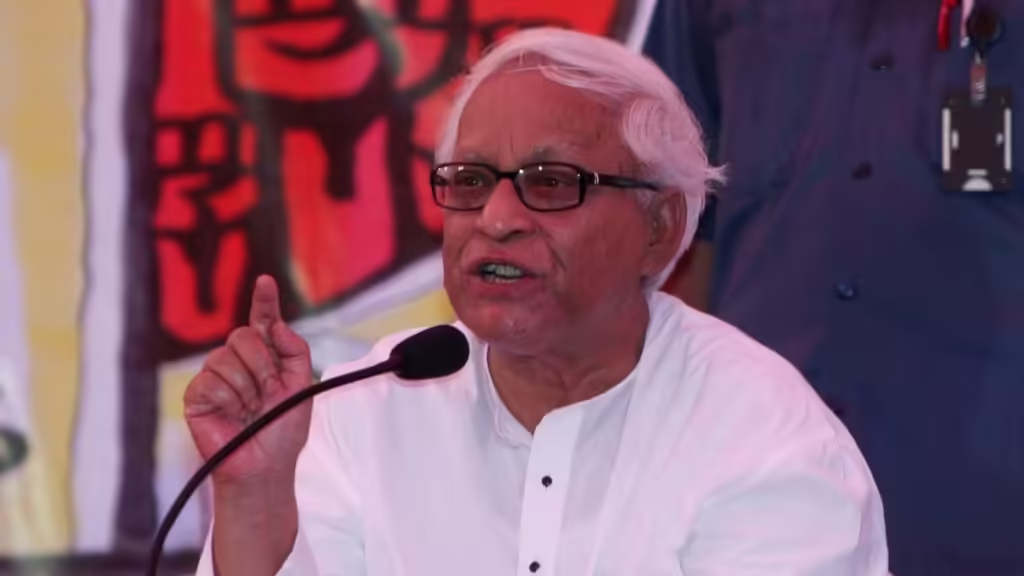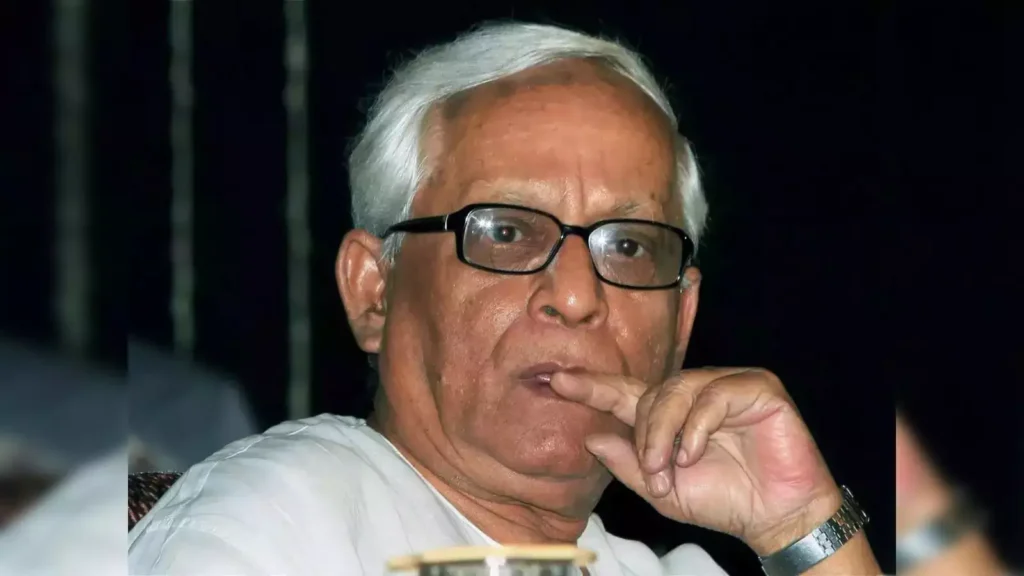Buddhadeb Bhattacharjee, popularly known as ‘Brand Buddha,’ embarked on a notable Marxist journey that left an indelible mark on West Bengal’s political landscape. Bhattacharjee, a staunch Marxist, served as the Chief Minister of West Bengal from 2000 to 2011. His tenure was characterized by efforts to modernize the state’s industrial sector while staying true to his Marxist principles.

The Marxist Journey of ‘Brand Buddha’ Buddhadeb Bhattacharjee
Early Life and Marxist Influences
Born in Kolkata on March 1, 1944, Buddhadeb Bhattacharjee was deeply influenced by Marxist ideology from a young age. Growing up in a politically active family, he was exposed to the ideas of Karl Marx and Lenin, which shaped his worldview. His early education at Presidency College, Kolkata, further solidified his commitment to Marxist principles. Bhattacharjee joined the Communist Party of India (Marxist) (CPI(M)) in the 1960s, quickly rising through the ranks due to his dedication, intellectual prowess, and unwavering commitment to the cause.
Political Ascent and Early Career
Bhattacharjee’s political career began in earnest when he became a member of the CPI(M) state committee in 1968. Over the next few decades, he held various key positions within the party, including serving as the Minister of Information and Cultural Affairs in the West Bengal government. His tenure in this role was marked by efforts to promote Bengali culture and literature, aligning with his belief in preserving regional identity while advocating for socialist principles.
Becoming Chief Minister
In 2000, Bhattacharjee succeeded Jyoti Basu as the Chief Minister of West Bengal, inheriting a state with significant economic challenges. His leadership marked a departure from Basu’s policies, with a stronger focus on industrialization and modernization. Bhattacharjee’s vision was to transform West Bengal into an industrial hub while maintaining a commitment to social justice and the welfare of the working class.
Economic Policies and Industrialization Efforts
Bhattacharjee’s tenure as Chief Minister was characterized by efforts to attract investment and improve infrastructure. He believed that industrial development was essential for economic growth and job creation. His government implemented policies to facilitate the establishment of industries, aiming to boost the state’s economy. Notable initiatives included the promotion of IT parks and special economic zones (SEZs) to attract multinational companies and create employment opportunities.

Controversies and Challenges
Despite his ambitious vision, Bhattacharjee’s tenure was not without controversy. The land acquisition policies for industrial projects, particularly in Singur and Nandigram, led to significant unrest and criticism. The government’s decision to acquire agricultural land for industrial purposes faced strong opposition from farmers and local communities. In Singur, the acquisition of land for a Tata Motors car factory sparked widespread protests, resulting in violent clashes and a prolonged political crisis.
Similarly, in Nandigram, plans to acquire land for a SEZ led to violent confrontations between the police and local residents. The incidents in Singur and Nandigram highlighted the tensions between development and displacement, and Bhattacharjee’s government faced severe backlash from opposition parties, civil society, and even within the CPI(M). These controversies significantly impacted Bhattacharjee’s political standing and the party’s image, leading to electoral setbacks.
Commitment to Marxist Values
Despite these challenges, Bhattacharjee remained committed to his vision of a modern, industrialized West Bengal grounded in Marxist values. He believed that economic development was essential for improving the living standards of the working class and reducing poverty. Bhattacharjee’s policies aimed to strike a balance between attracting investment and ensuring social justice. He advocated for labor rights, fair wages, and social welfare programs to support the underprivileged.
Legacy and Impact
Bhattacharjee’s legacy is a complex one, reflecting both the successes and struggles of implementing Marxist principles in a rapidly changing economic landscape. On one hand, his tenure saw significant investments in infrastructure and industry, contributing to the modernization of West Bengal’s economy. The development of IT parks and the growth of the services sector created new job opportunities and boosted the state’s GDP.
On the other hand, the controversies surrounding land acquisition and the displacement of farmers left a lasting impact on Bhattacharjee’s political career and the CPI’s fortunes in West Bengal. The party’s defeat in the 2011 assembly elections marked the end of 34 years of Left Front rule in the state, highlighting the complex interplay between development policies and political realities.

Conclusion
Buddhadeb Bhattacharjee’s journey as ‘Brand Buddha’ is a testament to the enduring influence of Marxist ideology in Indian politics and the ongoing debate over balancing development with social equity. His tenure as Chief Minister showcased the challenges of pursuing industrialization within a Marxist framework, emphasizing the need for inclusive growth that addresses the concerns of all stakeholders. Bhattacharjee’s efforts to modernize West Bengal while upholding Marxist values continue to inspire debates on the role of socialism in contemporary economic policy, reflecting the enduring relevance of his legacy in Indian politics.
Stay tuned to Club4Celebs for more updates.


